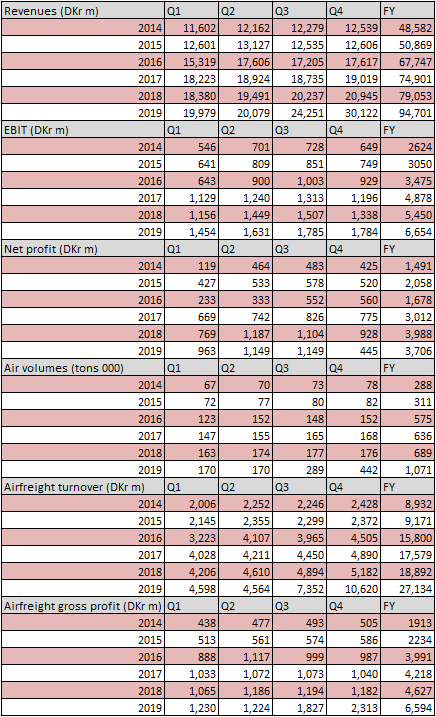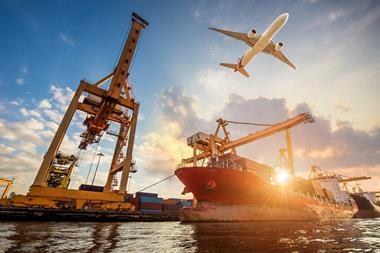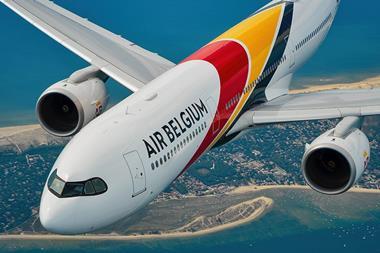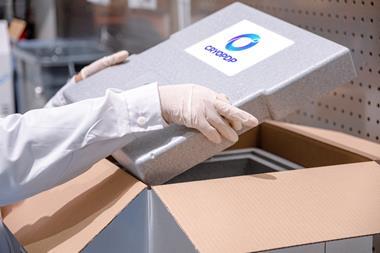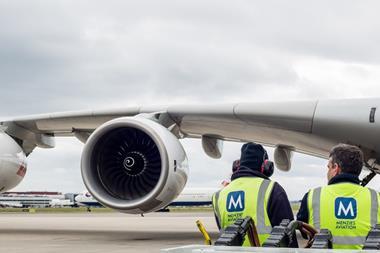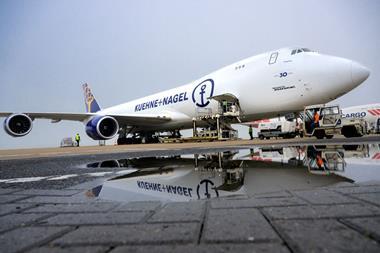DSV saw airfreight revenues and volumes improve last year thanks to its acquisition of Panalpina in August, but margins came under pressure.
In 2019, the combined DSV Panalpina Group saw total revenues increase 19.8% year on year to DKr94.7bn, earnings before interest and tax (ebit) improved by 22.1% to Dkr6.6bn but profits slipped 7% to DKr3.7bn. This is compared with DSV's results in 2018.
The company said the decline in net profits was the result of integration costs and higher net financial expenses.
The operating margin, when excluding the impact of new accounting standards, slipped from 6.9% to 6.6%.
“The decline in margins was attributable to the Panalpina integration, which initially had an adverse effect on the margins of the Group,” the company said.
“As integration progresses and synergies are realised, margins are expected to increase.”
Looking at the airfreight business, full-year volumes increased 55% on 2018 to 1.1m tons, revenues were up 43.6% to DKr27.1bn and gross profit improved by 42.5% to DKr6.6bn.
If Panalpina’s figures are stripped out from the results, DSV would have registered a 2% decline in airfreight demand.
“The global airfreight market saw a decline in transport volumes of 3-4% in 2019,” DSV Panalpina said in a statement.
“Exports out of China and Germany were among the weakest markets measured by volume.
“From an industry perspective, the slowdown in the automotive industry had a negative impact on air volumes, but several other sectors were also in decline.
“The weak airfreight market led to overcapacity and low airfreight rates on most trade lanes.
“DSV Air & Sea achieved growth in airfreight volumes of 55% for 2019, mainly driven by the addition of Panalpina.
“The legacy DSV air volumes saw a decline of approximately 2% for 2019 and were, especially in the second half of the year, impacted by the weak market.”
DSV Panalpina said the second half of the year was intensely focussed on integrating the two businesses.
In addition to the physical integration, a comprehensive IT integration was initiated across the entire organisation, gradually migrating Panalpina users and customers onto DSV’s IT infrastructure and merging back-office functions.
Panalpina added new activities to the division: Perishables represented a significant part of Panalpina’s airfreight volume.
Perishables is a growth market, but carries a low gross margin.
Also, through Panalpina’s Freighter Network, the company now controls a limited amount of own airfreight capacity, including a leased Boeing 747 freighter.
“Both business areas will be subject to further assessment of profitability and return on investment in 2020,” the company said in a statement.
“With the Freighter Network came a gateway in Luxemburg, which constitutes a major hub that strengthened our global airfreight network.”
Looking ahead, the Panalpina integration is expected to be completed next year.
“Our ability to take market share will be limited in the busiest integration period, but we will do our utmost to get back on the growth track as soon as possible,” said chief executive Jens Bjorn Andersen.
“We are well-positioned for further growth within all three divisions
“It is difficult to predict the market situation in 2020. Uncertainty related to trade tariffs, Brexit and geopolitical unrest in general has long loomed and may play a part in the year to come.
“As always, we will keep a close eye on developments and rely on our flexible business model, which allows us to quickly adjust capacity up or down.”
